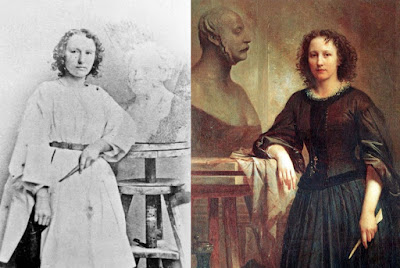By Jacqui Nelson
Life can take us down many paths. How does a German stone carver's daughter go from sculpting the European elite to sculpting Texas heroes? First came tenacity, then talent, then tuberculosis.
Around the turn of the 19th century, the tuberculosis death rate worldwide was estimated at 7 million people a year, so tuberculosis definitely could be a life-changer. Even though Elisabet Ney never had tuberculosis, it resulted in her leaving her birthplace of Germany and eventually living in Texas sculpting Stephen F. Austin and Sam Houston.
Franzisca Bernadina Wilhelmina Elisabeth Ney
( born 1833 in Münster, Germany )
( born 1833 in Münster, Germany )
Elisabet (the spelling without the "h" seems to be the name most often used when referring to her by one name) grew up assisting her father in his stone-carving business. When her parents later opposed her becoming a sculptor, she went on a hunger strike. That's tenacity.
 |
| King Ludwig II |
In 1857, she set up her own studio in Berlin and sculpted portraits of philosopher Arthur Schopenhauer, composer Richard Wagner, folklorist Jacob Grimm, Chancellor Otto von Bismarck, General Giuseppe Garibaldi, King George V of Hanover, and King Ludwig II of Bavaria. That seems like a dual talent: getting the job done and pleasing those elite figures.
In 1853, Elisabet met Edmund Montgomery, a Scottish medical student, scientist, and philosopher. They kept in touch and, although she viewed the institution of marriage as a state of bondage for women, she married Edmund in 1863.
Marriage did not change Elisabet's views on the role of women. She refused to take her husband's name, chose to wear trousers and a black artist frock coat, and rode horses astride.
What changed Elisabet—at least as far as where she went next—was tuberculosis. The same year that she was married, her husband was diagnosed with the deadly disease.
In 1871, Elisabet and Edmund immigrated to the United States to join a colony in Georgia that was promoted as a healing resort for those afflicted with tuberculosis. When that didn't work out, they searched for a new home. Elisabet traveled alone to Texas to see the Liendo Plantation in Waller County. When her husband was finally able to join her, they purchased the plantation.
For the next ten years, Elisabet concentrated on running the plantation and raising a son while her husband focused on his research. Only in the early 1880s, did Elisabet restart her artistic career—after being invited to Austin by Governor Oran M. Roberts.
Despite the supplement of $32,000 from the Texas state legislature, Elisabet missed her deadline and the Houston and Austin sculptures couldn't be shown at the Exhibition. They can now be seen in the Texas State Capitol in Austin and in the National Statuary Hall Collection in the U.S. Capitol in Washington, D.C.
Elisabet kept sculpting and died in her Texas studio in 1907.
Elisabet Ney traveled far and immersed herself in several careers, but she always came back to sculpting. Writing, I think, is like sculpting or painting or any creative endeavor. People start with a blank page or block of stone and shape something (after heading down a creative path) that other people will hopefully connect with.
If you'd like to see where my creative endeavors have taken me, head to MY BOOK PAGE on my website where you'll find links to read excerpts from (and view picture inspiration boards for) all of my stories.
~ * ~
Download MY FREE STORY Rescuing Raven (Raven & Charlie's story in Deadwood 1876)
Read more of my
Join me on
Follow me on






An interesting lady. Her sculptures are awesome. Thank you for sharing Jacqui.
ReplyDelete